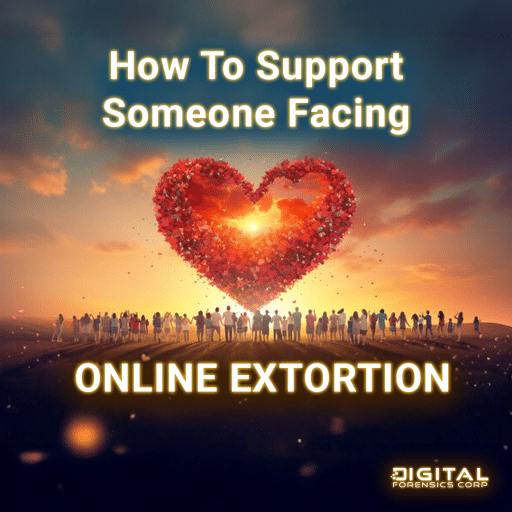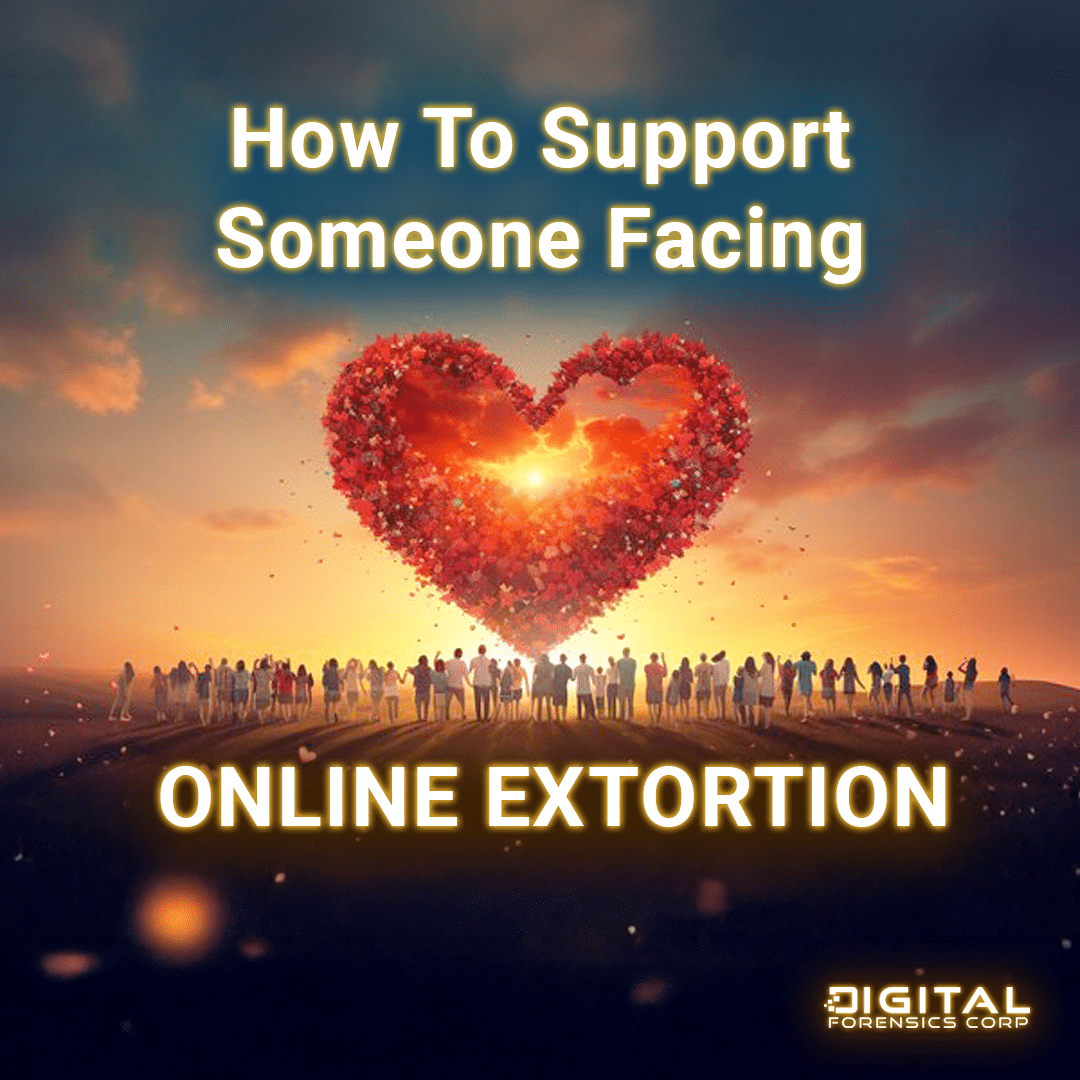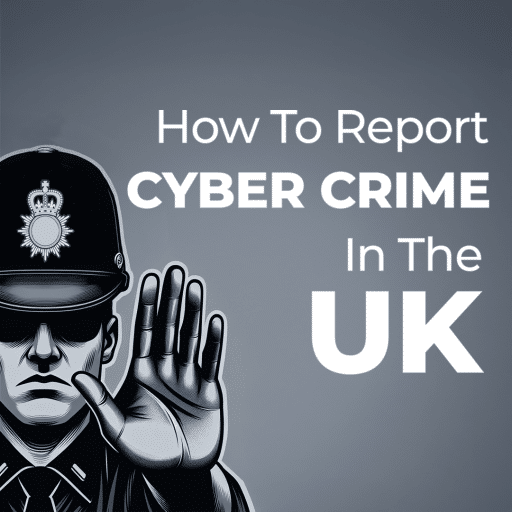Having a family member who is caught up in online extortion seems like something that would never happen to someone in your family or to a friend, but it is more common than you think. Anyone who is online can connect with anyone in the world, and most of the time it enriches peoples lives when they meet someone special or start an online relationship that can lead to a positive life experience, where both consenting individuals have found someone for friendship or an intimate relationship. But there is a dark side to finding people online and sometimes it can lead to terrible circumstances, leading to loss of self-esteem, money, dignity, and self-respect.
If this has happened to someone you love, it can be difficult for you seeing them in this situation. But there are some ways you can be supportive of them and give them the attention they need to deal with this unfortunate situation. The key is not to be judgmental and do not blame them; this is the time to offer practical and emotional support.
Even since the internet became mainstream in everyday life for millions of people, there are many victims who fall prey to the opportunistic perpetrators more and more each year. Just in 2022 alone the Federal Trade Commission claims there were 70,000 people who reported a romance scam with financial losses of up to $1.3 billion, with an average median loss of $4,400(1). According to FBI data, over a 17-month period from October 2021 to March 2023, sextortion scams involved at least 12,600 victims—primarily boys, and people aged 18-29 were over six times as likely to report sextortion than people 30 and over(2). As you can see the numbers are staggering and growing each year, as more and more people meet online.
If you or someone you know has been attacked by a scammer in a cybercrime, Digital Forensics is here to help. We are a reputable cyber security company that helps victims in their time of need. We hope this article gives you and your loved ones the information they need to overcome any scam that is having negative implications on them.
What is Cyber Extortion?
There are several ways a stranger or criminal can use cyber extortion to get something out of you like money or other malicious behavior and requests. The three main forms of Cyber Extortion include Sextortion, Online Blackmail and Romance scams.
- Sextortion: This will usually start on the any of the popular apps like messaging when the perpetrator will claim they have a picture or a video and will release or publish it on online to everyone they know unless they send them more pictures. In some cases, they will threaten them or make financial requests to stop it.
- Online Blackmail: This is when the scammers claim to have gained access to your personal computer or device and they now have incriminating/compromising pictures or videos of you. They will usually contact you with an email, or text you, and use other ways to message you and start the threatening conversations.
- Romance Scams: This is when the perpetrator will chat with you online via a dating site, apps or social media with flattering or sexual language, but it is usually catfishing. This is when they have merely posted fake photos of themselves to gain your interest. They usually have financial requests or a false need for financial assistance.
Warning Signs That Your Loved One is Being Scammed
Victims of cyber scams tend to present signs that something is wrong. Some are subtle, while others are much more noticeable.
Isolation is a tell tale sign that someone has been victimized. They may feel embarrassed and do not want anyone to know what happened and how they got catfished. This results in a withdrawal from their daily lives as they try to hide what is going on due to a fear of being judged. These days it is easier than think to get catfished, as the criminals will steal identities or create fake identities and falsify everything from their profession, interests, and what they like. Usually, they target people who are looking for love but are now some criminal’s mark, from a hot spot country.
What To Do If You Have Suspicions
If you think that something has happened to a family member, friend or loved one, the best thing to do is simply start the conversation, but in an unforceful and judgement-free way. One example may be to say something like, “what is the harm of looking into this or finding a professional to help?”
What You Can Do to Help
There are a few things you can do once you have talked to your family member, friend or loved one that has unfortunately been dragged into a romance scam of some sort. The first thing is to gain their trust and show some compassion, and let them know this can happen to anyone. First you can research the perpetrators profile, using reverse image searches or other background checks. Have your friend or family member start to assemble the evidence and document everything that has happened since they started talking to the fake person. This will show support and allow them to want to work together so that you can suggest that there are professionals who know how to handle these situations.
Overcoming Resistance
If the individual that you know is being resistant to your assistance and concern, you need to prepare yourself for them not wanting you to get involved. You need to carefully breakdown the “I’m too embarrassed” barrier and let them know that you want to help them and make sure they get their life back to normal. Show them some sympathy and tell them that there are many ways to bring the perpetrators to justice. Remind them, this is a crime and they might be helping the next victim if they catch the criminal and stop it from happening again.

Resources and Next Steps
There are basically two main law enforcement agencies that are operated by the US government who will deal with any forms of Sextortion, Cyber Blackmail, or Romance scams.
- FBI: The Federal Bureau of Investigation is a government agency responsible for investigation all forms of crimes like terrorism, cybercrime, or even public corruption. They can even assist if the perpetrator is in another country, though this may cause delays in your desired results. They will gather, share, and analyze intelligence associated with these cybercrimes.
- FTC: The Federal Trade Commission is another government agency that protects consumers from scams and fraud. They will accept complaints from consumers who are victims of cybercrime and help people identify with, stop, or avoid any form of fraud or scams.
Support Groups
There are several organizations or groups that can help and support you like the Cyber Civil Rights crisis helpline and they are compassionate and are cross-trained representatives that can provide support for victims, information that will help them, referrals, and even legal advice. Others include Crime Stoppers who have a hotline for victims to call and they also have lots of information on their website and keeping safe guidelines. There are also local organizations in each state that provide support groups for crimes such as sextortion, online blackmail, and romance scams. It is best to contact local communities or groups that are readily available to help in all circumstances.
Cybersecurity firms and specialists they can contact
If the victim has already lost money by giving it to the perpetrator, there are ways they can attempt recover the lost funds. There are factors that will affect the ability of any law enforcement or financial institution to recover what the criminal was able to extort, but it is worth investigating.
If this is the course you’d like to take, we suggest working for a cyber security firm that specializes in forensic accounting. These organizations investigate cybercrimes and compile evidence associated with the data left behind by any digital communication. Using this information, they’ll track where the money went, the first step for active recovery.
Help From Digital Forensics Corp.
We are here to help you when your loved one feels overwhelmed by being victimized by any form of cybercrime, and do everything we can to find the perpetrators and bring them to justice.
How we work is important to know. First, we will need the victim’s consent to perform any cyber security investigation, and we must work directly with the victim to get started. Secondly, we suggest you start the process of securing all your personal online accounts and begin gathering evidence you will be able to use against them when the time comes.
Do not attempt to confront the criminals yourself as this could make things worse. It is best to have a highly skilled team like those at the Digital Forensics Corp that are trained to deal with offenders who conduct cybercrime against innocent people.
Bring peace of mind to your loved ones and justice to the scammers. Contact Digital Forensics Corp. today.
Sources.
- https://www.ftc.gov/news-events/data-visualizations/data-spotlight/2023/02/romance-scammers-favorite-lies-exposed
- https://securitybrief.in/story/romance-scams-reach-six-year-high-moody-s-reports
- https://cybercivilrights.org/ccri-crisis-helpline/
- https://www.crimestoppersusa.org/
- https://www.cagoldberglaw.com/practice-areas/victims-rights/online-blackmail-extortion-and-sextortion/
DISCLAIMER: THIS POST IS FOR INFORMATIONAL PURPOSES ONLY AND IS NOT TO BE CONSIDERED LEGAL ADVICE ON ANY SUBJECT MATTER. DIGITAL FORENSICS CORP. IS NOT A LAWFIRM AND DOES NOT PROVIDE LEGAL ADVICE OR SERVICES. By viewing posts, the reader understands there is no attorney-client relationship, the post should not be used as a substitute for legal advice from a licensed professional attorney, and readers are urged to consult their own legal counsel on any specific legal questions concerning a specific situation.







